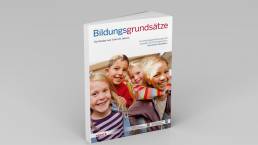Our curriculum
The learning framework
We see our students as young world citizens who actively and curiously explore their environment, who form ideas and hypotheses about how the world works, and who reexamine and adjust their ideas based on newly acquired knowledge.
Our pedagogical staff guide and support this process by constantly reconnecting it to our Areas of Exploration (AOEs).
Building strong relationships
Strong relationships between all stakeholders are the single most important foundation of learning. Our educators work tirelessly on building and maintaining relationships based on trust, respect, and care—not just with the children, but with everyone in the rainbowtrekkers community.
This spirit permeates our entire learning framework and develops children who are confident, balanced, and knowledgeable.
Driven by children, constructed by educators
Our daily work is driven by the children’s interests and curiosity. At the same time, we look at our students’ futures. If a group of children is interested in everything about dinosaurs, for example, our educators find meaningful learning experiences to connect this interest with our framework and the areas of knowledge we have identified. Such learning experiences could, for example, encourage children to use and expand their vocabulary when talking about dinosaurs.
They could also encourage mathematical thinking, i.e. comparing sizes and shape or could give children the possibility to draw, enact, or mimic dinosaurs. There are countless other examples, of course, and these are made visible in each of our institutions.
Educational principles
At rainbowtrekkers, we have decided, precisely because of our international approach, to align our educational program primarily with the local curricula (“educational principles”) of North Rhine-Westphalia. From our point of view, this does not only make sense because the majority of the children who attend our kindergarten centers transfer to the German regular school system when they start school. Rather, we see the alignment with the educational principles of North Rhine-Westphalia as a clear signal of appreciation for the comparatively holistic educational approach compared to other countries. Unlike in the school sector, we have the luxury in our daycare centers that learning can take place out of intrinsic motives and not out of pressure to perform. We would like to preserve this freedom.
In the educational principles of North Rhine-Westphalia, this holistic approach is described thus:
Children want to make a picture of the world for themselves. No one else can do this for them. Seen in this way, education is self-education. Self-education is to be understood as an individual process that includes personal, room and material factors. Children learn and educate themselves through what they perceive with their own senses and experience in a social context. Through this, they open up their environment, construct their images of the world and give them a subjective meaning.
Children do not educate themselves by merely taking over ready-made knowledge and skills from others, but only when they deal with them themselves. They form themselves in the encounter and in the confrontation with other people and different situations.
Education is thus a process that exists in the context of the child and its environment. The child’s individual developmental prerequisites are always at the center of this process. Knowledge of a child’s strengths, interests and needs as well as his or her perspective are the starting point for successful educational processes. They are holistic in nature – and many people are involved in them: Parents, professionals and teachers, other caregivers, other children and adults. They all […] have an important role model function.
In educational processes, children must be given sufficient time to find their own rhythm and their own learning paths: Educational processes are thus highly individual. As children grow older, targeted pedagogical support takes on greater importance, without the basic principle – the active child – losing any of its significance.
In order to present the educational processes in their thematic, content-related focal points and characteristics, they have been divided into ten educational areas:
- movement
- body, health and nutrition
- language and communication
- social and (inter)cultural education
- musical and aesthetic education
- religion and ethics
- mathematical education
- scientific and technical education
- ecological education
- media
It must be taken into account that these areas can only in theory be separated from each other, but in practice they necessarily overlap in many cases: Children do not choose educational subjects according to a system of categories, but rather on the basis of their interests and the individual opportunities they have in their everyday lives and experiences.
In this respect, the content-related delimitation of educational areas follows the mental logic of adults rather than the way a child actually learns. This presentation serves to mentally structure the variety of experiential possibilities. The educational areas listed do not claim to be complete or universally valid. They are intended to help professionals examine their own practice to determine whether the child is actually given sufficient opportunity to experience comprehensive and fundamental educational and experiential processes. Thus, the educational areas are open for further development processes and individual adaptation in our facilities on site.
Further information
Members of:




